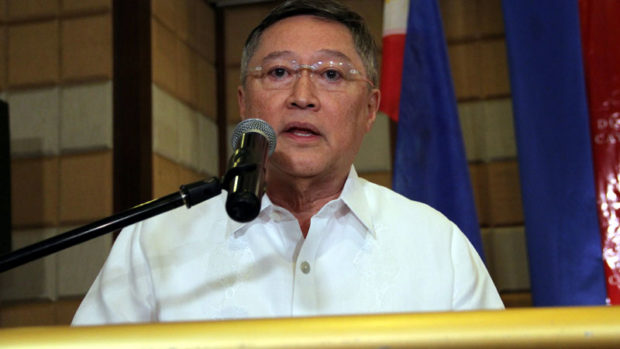CLARK FREEPORT—The head of the Duterte administration’s economic team reiterated Monday that the Philippines will not fall into a debt trap as it turns to China and Japan to finance the Duterte administration’s ambitious “Build, Build, Build” program.
“Some uninformed critics claim that we are falling into a debt trap by tapping Chinese and Japanese financing for our strategic infrastructure projects. This is totally unfounded. The financing we availed of are soft loans at the lowest possible interest rates and the longest possible term arrangements,” Finance Secretary Carlos Dominguez III told the third leg of the Sulong Pilipinas 2018: Philippine Development Forum.
“If we include project financing coming this year, our estimated project debt to China will only constitute 0.65 percent of our total debt from the current 0.11 percent. Our project debt to Japan will increase from the current 3.17 percent to 8.9 percent of the total debt at the end of this year,” Dominguez added.
The Finance chief said that when the Duterte administration ended in 2022, and the majority of financing for ‘Build, Build, Build’ accessed, debt to China would only be 4.5 percent of the estimated total, while borrowings from Japan would have a bigger share of 9.5 percent.
“So there is no danger of us being drowned by Chinese debt,” Dominguez said.
“We borrow with great prudence, aware that it is the taxpayer who ultimately pays for the debt. We always keep in mind that the money we borrow come from the taxes dutifully paid by the people of the countries that have continued to generously support us. Thus, we take care that the funds we borrow are wisely used and will produce sufficient economic benefits to make the debt service easier down the road,” the Finance chief added.
Dominguez said the present administration was being careful not to repeat the mistakes made in the past.
“In the past administration, there was a big scandal involving Chinese financing. And the reason for that, is that administration allowed the Chinese state-owned enterprises to dictate what projects are going to be done here,” Dominguez noted, referring to the North Rail controversy during the Arroyo administration.
“In our case, we have told the Chinese that it is only us who will determine what projects we will embark on without any interference from them. So all the projects that we have decided to get on are all generated locally and go through the approvals that are required by law, which is essentially the Neda (National Economic and Development Authority) Board approval. When these projects are approved, we then go to the funding agencies and say, okay, which ones do you want to fund? And then they make an offer,” Dominguez said.
“And what happens particularly in the Chinese projects, once they have agreed to fund the project, we ask them to submit three names as bidders for their project. So the Chinese government is involved in the choice of the bidders. So if the bidders don’t perform, the Chinese government is on the hook here,” he added.
“So this is the way this administration, as ordered by President Duterte, is protecting the Philippines from projects that are unnecessary and are driven by agencies outside of the Philippines. Incidentally, this system is not popular with certain people who try to influence our government to do this project or that project. So please expect attacks on us because they are not making illicit money,” according to Dominguez.
So far, the Duterte administration had signed only one Chinese loan agreement worth P3.1 billion for the P4.4-billion Chico River Pump Irrigation facility, the first flagship infrastructure project to be financed by the mainland.
